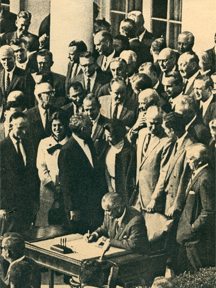In 1940, as war overtook Europe and cast its shadow across the Atlantic, the United Chapters of Phi Beta Kappa (the Society’s name at that time) endorsed the support of the liberal arts and sciences in America’s colleges and universities as a part of the defense of civilization against barbarism. A major campaign ensued, to secure the place of Phi Beta Kappa in American life. The role the Society has played in the last seventy years, expanding its presence and influence, is in large part due to that renewal. The rhetoric of that age is still inspiring, though it may sound somewhat dated to twenty-first century ears.
A generation later, at the height of the Cold War, Phi Beta Kappa was one of three national organizations sponsoring a National Commission on the Humanities. A few years earlier Sputnik had prompted a surge of attention to science education and research. By 1963, the voices of Phi Beta Kappa, the American Council of Learned Societies, and the Council of Graduate Schools joined in a report recommending the establishment of independent government agencies to support the arts and the humanities. The result was the formation of the National Endowment for the Arts, and the National Endowment for the Humanities. The language of that Report is still instructive.
Now, almost fifty years on, the time has come again. In December, 2012, the Phi Beta Kappa Senate endorsed the creation of a multi-year Advocacy Initiative for the liberal arts and sciences. The governing body of the Society entrusted the Secretary and its own Executive Committee with designing and coordinating a series of local, regional, and national events, the purpose of which would be to strengthen appreciation of the liberal arts and sciences, to identify and equip allies in the spheres of business, politics, and media, and to ensure legislative, institutional, and financial commitment to its support. Expressing support for Secretary John Churchill and the national office staff in their efforts to implement this project, the Senate pledged to stand ready to assist in this important effort in the days ahead.
Secretary Churchill greeted this resolution with enthusiasm, saying, “Phi Beta Kappa is in the planning stages of a major, national initiative to advocate renewed support for the liberal arts and sciences. Our intended audience comprises all decision-makers and opinion-shapers who hold America’s higher education infrastructure in trust.”
He went on to say that the Society’s aim would be to assist legislators, trustees, members of state boards of higher education, and others, similarly placed, to reframe their thinking about the purposes of higher education. Phi Beta Kappa’s hope, he said, is to complement what he called “the current ruling ideas, narrowly focused on short-term job preparation,” with a renewed awareness of the importance of higher education across a wider range of purposes. Phi Beta Kappa’s interest in the liberal arts, Churchill said, lies in their role in preparing people for whole careers, not just initial jobs, and in building the dispositions of citizenship essential to the maintenance of a democratic society. He referred further to engaging students in issues and experiences that raise the level of American society as a whole toward fuller visions of human flourishing, and equipping individuals and society to deal responsibly with matters of meaning and value.
In advocating these aims, Churchill said, Phi Beta Kappa will encourage the stewards of higher education to be mindful of the liberal arts and sciences as vital, central elements of its mission, not frills or dispensable luxuries.
To achieve these goals, the national office of Phi Beta Kappa has envisioned a series of meetings across the country, in late 2013, building in large part on its existing network of 283 chapters, sixty alumni associations, and seven regional districts. Secretary Churchill said the Society will draw on a significant fraction of its half-million members of Phi Beta as direct emissaries to the intended audience, and would equip those emissaries with a concise, consistent, and persuasive message to deliver on behalf of the liberal arts and sciences in the years 2014 and 2015. The initiative is projected to run through the 44th Triennial Council of Phi Beta Kappa, to be held in Denver, Colorado, October 8-10, 2015. Churchill said Phi Beta Kappa anticipates coordinating its efforts and message with a variety of partners in advocacy.
Photo: President Lyndon Johnson signing the legislation to create the National Endowment for the Humanities and the National Endowment for the Arts, September 29, 1965.




